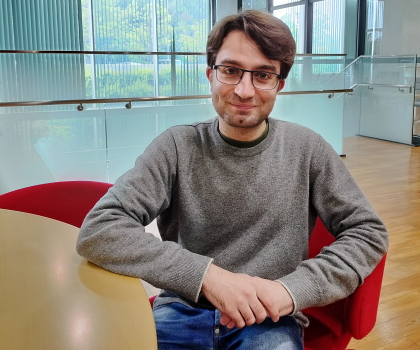Sergio Gurgone

Main Lab Location:
CiNet (Main bldg.)Specific Research Topic:
Motor Control, Motor Learning, Muscle Synergies, Myoelectric ControlMailing Address:
1-4, Yamadaoka, Suita, Osaka 565-0871 JapanEmail:
sgurgone at nict.go.jpMy study focuses on the influence of sensory feedback information on the generation of movement representations in the brain. My aim is to elucidate the neural mechanisms by which proprioceptive information (i.e., the sensation related to body position and movement) shapes the memory of human motor learning using behavioral and computational methods.
During my Ph.D. in Applied Physics, I worked on muscle synergy theory, which hypothesizes that movement is generated by recruiting coordinated groups of muscles (i.e., the muscle synergies). I also worked on muscular null space, the set of muscle activations not generating movement, and how to use such patterns for motor augmentation, i.e., for controlling additional movement degrees of freedom, such as additional limbs.
Selected Publications:
Gurgone S., Borzelli D., De Pasquale P., Berger D. J., Baldi T. L., D’Aurizio N., Prattichizzo D., d’Avella A. (2022). Simultaneous control of natural and extra degrees of freedom by isometric force and electromyographic activity in the muscle-to-force null space. Journal of Neural Engineering, 19(1), 016004.
Borzelli D., Gurgone S., De Pasquale P., Lotti N., d’Avella A., Gastaldi L. (2023). Use of Surface Electromyography to Estimate End-Point Force in Redundant Systems: Comparison between Linear Approaches. Bioengineering. 2023; 10(2):234.
Borzelli D., Gurgone S., Mezzetti M., De Pasquale P., Berger D. J., Milardi D., Acri G., D’Avella, A. (2022). Adaptation to virtual surgeries across multiple practice sessions. In Converging Clinical and Engineering Research on Neurorehabilitation IV: Proceedings of the 5th International Conference on Neurorehabilitation (ICNR2020), October 13–16, 2020 (pp. 563-568). Springer International Publishing.
